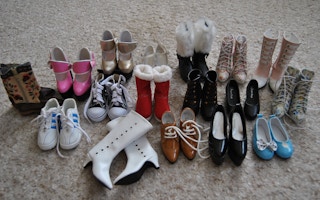Singapore residents now have an easy way to donate used clothes, toys, book, electronics and furniture to charity – without having to leave their homes.
To continue reading, subscribe to Eco‑Business.
There's something for everyone. We offer a range of subscription plans.
- Access our stories and receive our Insights Weekly newsletter with the free EB Member plan.
- Unlock unlimited access to our content and archive with EB Circle.
- Publish your content with EB Premium.
Share At Door Step (SADS) is a mobile app and website that enables people to clear out unwanted possessions by booking a pick-up service, which delivers the items to charities.
Founded by Delhi-based former Accenture analyst Anushka Jain in India in 2015, SADS soft-launched in Singapore in March in response to high demand for a door-to-door donation service in the convenience-oriented city-state.
SADS works by matching donated items with a charity that needs them, helping to eliminate the waste created by people who give away stuff that cannot be reused. Charities in Singapore recently complained that they have become a dumping ground for items that cannot be resold, for instance mouldy clothes or malfunctioning electronics.

Anushka Jain is the founder of Share At Door Step. Image: SADS
“People don’t have time to call around charities to check what they’ll take in, or deliver it themselves, so they usually end up either throwing it away or hoarding it,” she told Eco-Business. “The idea is to make giving away stuff so easy that people donate more.”
On average, consumers use a product for a third of its lifespan before throwing it away, and SADS helps to extend the life of consumer products by at least a year or two, she said.
Singapore is an ideal market for the service, because residents have relatively high disposable incomes and a lot to give away, and increasingly want to support the circular economy, said Jain. SADS launches a month after Singapore reported its lowest domestic recycling rate in more than a decade.
Jain insists that the idea behind the service is not to encourage further consumption by enabling consumers to clear out their homes to make space for more new stuff. “The idea is to declutter ‘for good’ – it’s not about giving away so you can to buy more. We want people to be more mindful of how they consume,” she said.
Users pay a fee to have their donations collected, depending on the weight of goods they give away. An option for “light” collections of up to 8 kilograms costs SG$19 (US$14) and a “medium” pick-up of up to 50kg costs SG$30 (US$22). Bulk collection drives available for corporates range from SG$50 (US$37) to SG$500 (US$371).
Users can earn rewards based on how much they have lowered their carbon footprint by making donations, although that feature has yet to launch in Singapore.
The service started to gain traction in April and now has made around 200 collections in Singapore, working with 15 charity partners. Jain said she is looking to work with corporate partners to scale the service.
Jain was inspired to launch SADS having witnessed her mother’s ordeal trying to donate goods to charity in India. Her mother only made donations once a year, because she was unsure where to send pre-loved goods and what sort of items were useful to charities.
As an asset-light company with no overheads, SADS has been able to launch in Singapore with little capital beyond marketing spend. The firm has been promoting the service in Singapore using Facebook and Instagram advertising.
In India, SADS has a user base of more than 1 million households and works with 135 charities in 11 cities, and with more than 120 corporate partners, including ride-hailing firm Uber, pharmaceuticals company GSK and the Royal Bank of Scotland.








